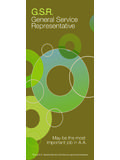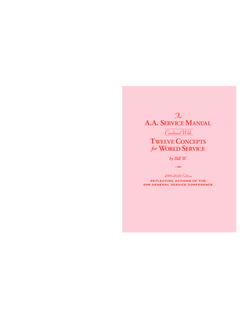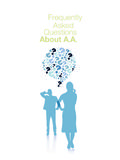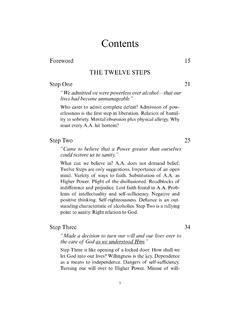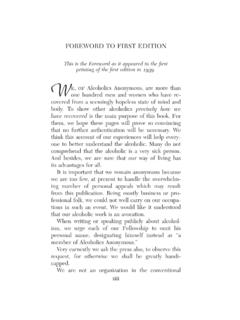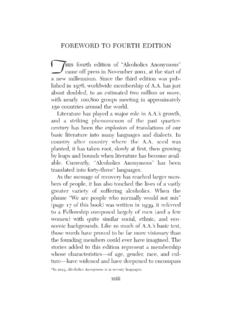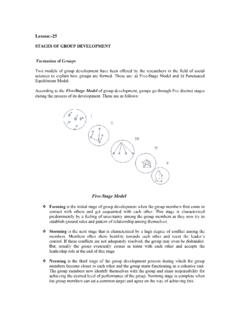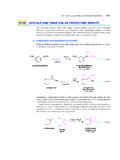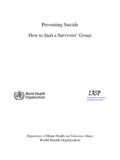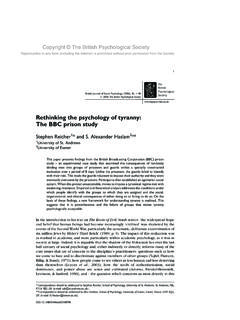Transcription of SMF-209 - Safety and A.A.: Our Common Welfare
1 Service Material from the General Service Office Safety AND : OUR Common Welfare . Safety is an important issue within one that all groups and members can address to develop workable solutions and help keep our meetings safe based on the fundamental principles of the Fellowship. Each member of Alcoholics Anonymous is but a small part of a great whole. must con- tinue to live or most of us will surely die. Hence our Common Welfare comes first. But individual Welfare follows close afterward.. Tradition One (Long Form). groups are spiritual entities made up of alcoholics who gather for the sole purpose of staying sober and helping other alcoholics to achieve sobriety.
2 Yet, we are not immune to the difficulties that affect the rest of humanity. Alcoholics Anonymous is a microcosm of the larger society within which we exist. Problems found in the outside world can also make their way into the rooms of As we strive to share in a spirit of trust, both at meetings and individually with sponsors and friends, it is reasonable for each member to expect a meaningful level of Safety . Those attending meetings derive a benefit by providing a safe environment in which alcoholics can focus on gaining and main- taining sobriety. The group can then fulfill its primary purpose to carry the message to the alcoholic who still suffers.
3 For this reason, groups and members discuss the topic of Safety . Autonomy and group Action Because , as such, ought never be organized, as indicated in Tradition Nine, it is individual members and groups who ensure that all members feel as safe as possible in There is no government within and no central authority, legal or otherwise, to control or direct the behavior of members. As embodied in the Fourth Tradition, the formation and operation of an group resides with the group conscience of its members. groups and service entities such as areas, districts, intergroup/central offices are autonomous. Recognizing that Safety is an issue of importance to its members, many groups have taken actions to keep distractions and disruptions to a minimum within the context of the group .
4 Membership membership has never been contingent on any set of behavioral or moral standards . beyond those founded on Common sense, courtesy, and the timeless values of kindness, toler- ance and love. 's Third Tradition states that the only requirement for membership is a desire to stop drinking. This brings an openness that helps to define our character as a diverse Fellowship; yet it also requires us to be mindful of our group and individual Safety . Some people, however, come into without an understanding of the type of behavior that is appropriate in meetings or in the company of other members. A person can be sober in , yet still not understand what is acceptable.
5 1. Dealing with Disruptions While most groups operate with a healthy balance of spontaneity and structure, there are a number of situations that can threaten group unity and challenge the Safety of the group and its members. Often this can center on disruptive individuals, those who are confrontational, aggres- sive, or those who are simply unwilling to put the needs of the group first. Such behavior can hijack the focus of a meeting and frighten members, new and old. Some groups have developed plans for addressing disruptive behavior and have estab- lished procedures through their group conscience to ensure that the group 's Welfare is protected.
6 In many cases, disruptive behavior is pre-empted by having the chairperson state the expecta- tions for behavior in the meeting. Some groups include in their opening announcements that illegal and disruptive behavior is not tolerated. Still other groups have asked disruptive members to leave the meeting. Addi- tionally, groups and members always have the option to call the appropriate authorities if disrup- tive behavior continues or anyone's Safety is at risk. group Safety and Unity Situations that groups have addressed through their group conscience include, sexual harass- ment or stalking; threats of violence; bullying; financial coercion; racial intolerance; sexual orien- tation or gender identification intolerance; pressuring members into a particular point of view or belief relating to medical treatments and/or medications, politics, religion, or other outside issues.
7 In addition, there may be other behaviors that go on outside of typical meeting times that may affect whether someone feels safe to return to the group . Some groups have their own guidelines or procedures to help keep the meeting safe. members can speak to those who are acting inappropriately. Situations can be discussed at business meetings to come to a group conscience about how to handle a situation. As a last resort, the disruptive member may be asked to stop attending the meeting for a specific period of time. Groups that take this drastic action do it in order to preserve the Common Welfare of the group and to maintain unity. In any situation, if a person's Safety is in jeopardy, or the situation breaches the law, the individuals involved can take appropriate action to ensure their Safety .
8 Calling the proper author- ities does not go against any Traditions. Anonymity is not a cloak protecting criminal or inappropriate behavior. Inappropriate or predatory behavior, such as unwanted sexual attention or targeting vul- nerable members can be especially troublesome. These behaviors may go on outside of typical meeting times. While members can be caring and supportive to those affected, we are not professionals trained to handle such situations. Law enforcement or other professional help may be necessary. Victims of inappropriate behavior, harassment or predators can let the group know about such situations, often through a sponsor or trusted friend.
9 This way the group is informed, and members can help address the situation and curtail further problems. group discussion should be focused on creating an environment where all alcoholics can find and maintain sobriety. and the Law Common sense and experience suggest that membership does not grant immunity from local regulations and being at an meeting does not put anyone beyond the jurisdiction of law enforcement officers. As individuals, members are also citizens of the world, and as 2. citizens we are not above the law. Through the group conscience process, many groups have established guidelines regard- ing when it may be appropriate to call authorities and handle a given situation within the legal system.
10 No group has to tolerate illegal behavior and any activity within an meeting is subject to the same laws that apply outside the meeting. The nature of illegal acts that groups have faced include violence, embezzlement, theft of property, drug sales at a meeting, and more. Emergencies Injuries, accidents, fires, etc., sometimes do occur during meetings. To accommodate these situations, groups can also develop plans and procedures, often in consultation with their land- lord or local authorities. Addressing an emergency situation is more important than continuing the meeting, and members should not hesitate to call emergency personnel in critical situations.

